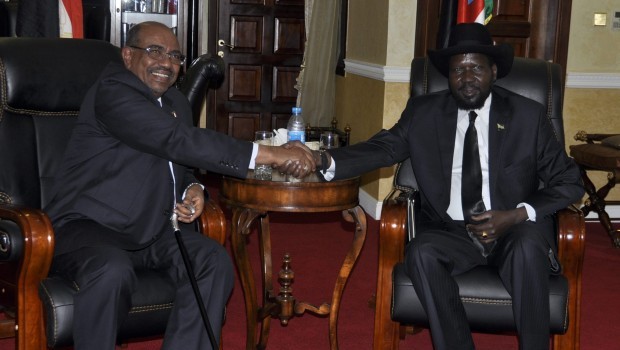
A file photo dated 12 April 2013 shows Sudanese President Omar Hassan al-Bashir (L) and his South Sudan counterpart Salva Kiir (R) shaking hands prior to a meeting in Juba, South Sudan. (EPA/PHILIP DHIL)
While the government in the South Sudanese capital of Juba is intent on holding a popular referendum on the disputed region of Abyei, Sudan opposes any unilateral steps.
Juba sources who spoke to Asharq Al-Awsat on the condition of anonymity said that the president of South Sudan, Salva Kiir, may issue a presidential decree granting government employees open leave in order to prepare for the referendum.
Government employees in Abyei are expected to go on leave in September.
The referendum will be held so that leaders of the Dinka Ngok tribe can decide whether to join South Sudan or to remain part of North Sudan.
Speaking exclusively to Asharq Al-Awsat, the Sudanese co-chair of the Abyei Joint Oversight Committee, Al-Khair Al-Fahim, said that the Abyei referendum will not be held and that the region is still subject to the 2004 Abyei Protocol in the Comprehensive Peace Agreement (CPA) and the Abyei Agreement for Administrative and Security Arrangement signed in June 2011.
Fahim also announced that any unilateral procedures will not be recognized by Khartoum, the Sudanese capital, adding that the government there will not return to war and that it “seeks to achieve peace and implement international treaties and agreements.”
He added that the referendum commission has not been formed by the two countries and that the status of Abyei is to be finalized by Presidents Omar Al-Bashir and Salva Kiir of Sudan and South Sudan respectively, along with the Ethiopian prime minister, Hailemariam Desalegn, and former South African president Thabo Mbeki.
For his part, South Sudanese co-chair of the Abyei Joint Oversight Committee Edward Leno told Asharq Al-Awsat that they “will hold the referendum on that date [in October] whether Khartoum agrees or not.”
“The Sudanese government has no right to the area,” he added.
Leno denied claims his government will take military measures in Abyei, while expressing the possibility that the Sudanese government and the Arab Messiria tribe, which is in a dispute with the Dinka Ngok tribe over the area, will resort to violence over the issue.
Sudan and South Sudan reached an agreement over the temporary administrative and security arrangements in Abyei on June 20, 2011. The African Union, among other major international players, has been advocating a referendum in order to reach a final settlement of the issue.
A 4,000-strong Ethiopian peacekeeping force has been deployed in the disputed territory.
In May, the leader of the Dinka Ngok tribe, Kual Deng Majok, was killed, along with the chief of UN peacekeeping force and 16 Messiria tribe members, in clashes. Investigations into that incident are still ongoing.
